Facebook Groups for Businesses
Are you active in Facebook Groups? In this article we explain how Facebook groups for businesses can be a great way to engage customers after sales, gather feedback from fans and critics, and even find new business. Businesses can use Facebook groups to engage with prospects without the hard sell.
You haven’t been sleeping on Facebook Groups, have you?
A brilliant way to outsmart the updated algorithm and build a tight-knit community with your target audience, they’re a totally underrated tool for today’s marketers.
That is, if you know how to navigate them.
Want to build your own sort of cult following? Looking to get your name out there front and centre to industry players and prospects?
Good!
In this quick and dirty guide, we break down the ins and outs of using Facebook Groups for business.
Whether you’re looking to start your own from scratch or network in existing ones, Groups are a goldmine for brands looking to connect with customers and influencers alike.
Why & When to Use Facebook Groups
If you’re on the fence about whether to get into Groups or beef up your business Page, choose the former.
Unless you’re a brick-and-mortar business or need to run a ton of page-specific ads, building up a business Page these days is a major uphill battle.
But Facebook Groups for businesses are totally different story. Here’s why Groups are killing it right now:
- Unlike business Pages, posts and interactions in Groups are not throttled by Facebook’s algorithm unlike most marketing content
- Whereas Pages are often reserved for big brands with existing followings, Groups are fair game for businesses of any size (including solo businesses and influencers)
- Groups provide endless opportunities for networking and community-building, both among your own customers and other brands’ audience
How to Find Relevant Facebook Groups for Business
Even if you intend to start your own Group, you should first familiarise yourself with the best practices and user experience of being in one first.
A quick Facebook Group search can clue you in on existing communities that might be relevant to your brand.
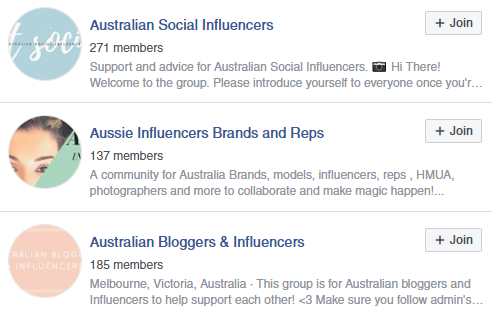
And beyond marketing-specific communities, many big brands boast Groups that offer community support where people can bounce ideas around.
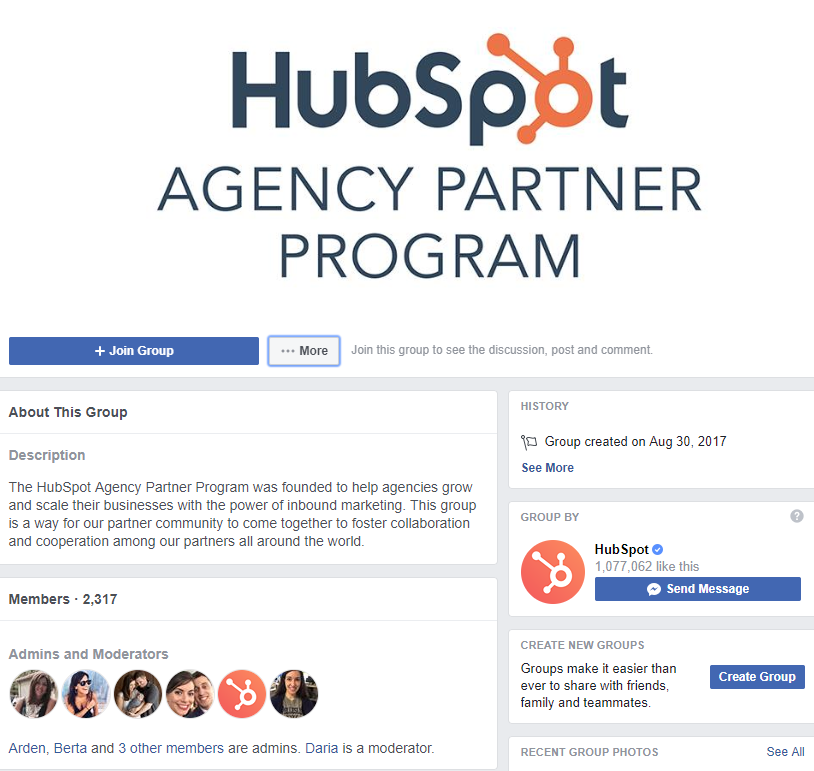
However, consider that many Facebook Groups for businesses are treated more like tight-knit communities.
As a result, their membership mostly grows through word of mouth and might require a bit of digging to find. Beyond Google, sites like Reddit and Medium can help you uncover relevant Facebook Groups as well.

Best Practices for Networking within Facebook Groups for Businesses
For brands and marketers alike, Facebook groups are a valuable tool for the following:
- Keeping up with industry trends
- Understanding the pain points, struggles and successes of fellow brands
- Showing off your know-how and ability to solve the problems of others
However, there are some common threads between most Facebook Groups for businesses when it comes to networking:
- No link-dropping
- No shameless self-promotion
Here’s a no-BS example of such policies in action from major marketing Group Traffic and Copy:
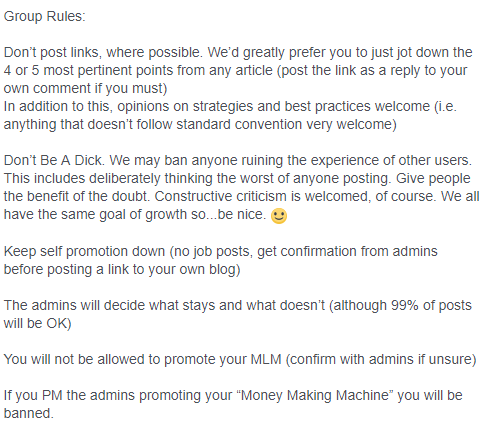
These types rules are pretty much universal as Facebook Groups must keep spam down for the sake of optics and engagement. This is something you should also bear in mind if you plan on creating your own Group in the future.
Don’t go into Groups expecting to score a flood of traffic.
Instead, remember that Facebook Groups are all about providing value. This means responding to questions and concerns without really expecting anything in return. Doing so speaks volumes for your brand and can be a brilliant way to grab the attention of customers or industry players.
How so? Consider that your conversations with Group members will organically pop up in people’s feeds.
In other words, every time you answer someone’s question or solve a problem, your stock goes up in eyes of the Group. When you’re networking among hundreds of thousands of people, that sort of influence is nothing to scoff at.
Creating Your Own Facebook Group
If you already have an audience and want to create your own Group, your head is in the right place. To set yourself up for success, consider the following must-do’s.
Define Your Purpose
First thing’s first: why are you creating a Facebook Group in the first place?
Looking to provide customer service? Network with local professionals in your industry? Just want somewhere to bounce ideas around?
The more specific you are about the “why” of your group, the better.
Fill Out Your Group Profile
For the sake of getting found by members and simply looking the part, your Facebook Group should be 100% “complete” prior to launch. This means taking care of the following:
- A detailed “About” section, including relevant links, rules and expectations for your members
- A pinned post to highlight your most recent promotions or content you want to point group members to (a community CTA, basically)
- Optimized imagery, including a relevant profile picture and Facebook cover (which you can quickly whip up with the help of tools like Canva)
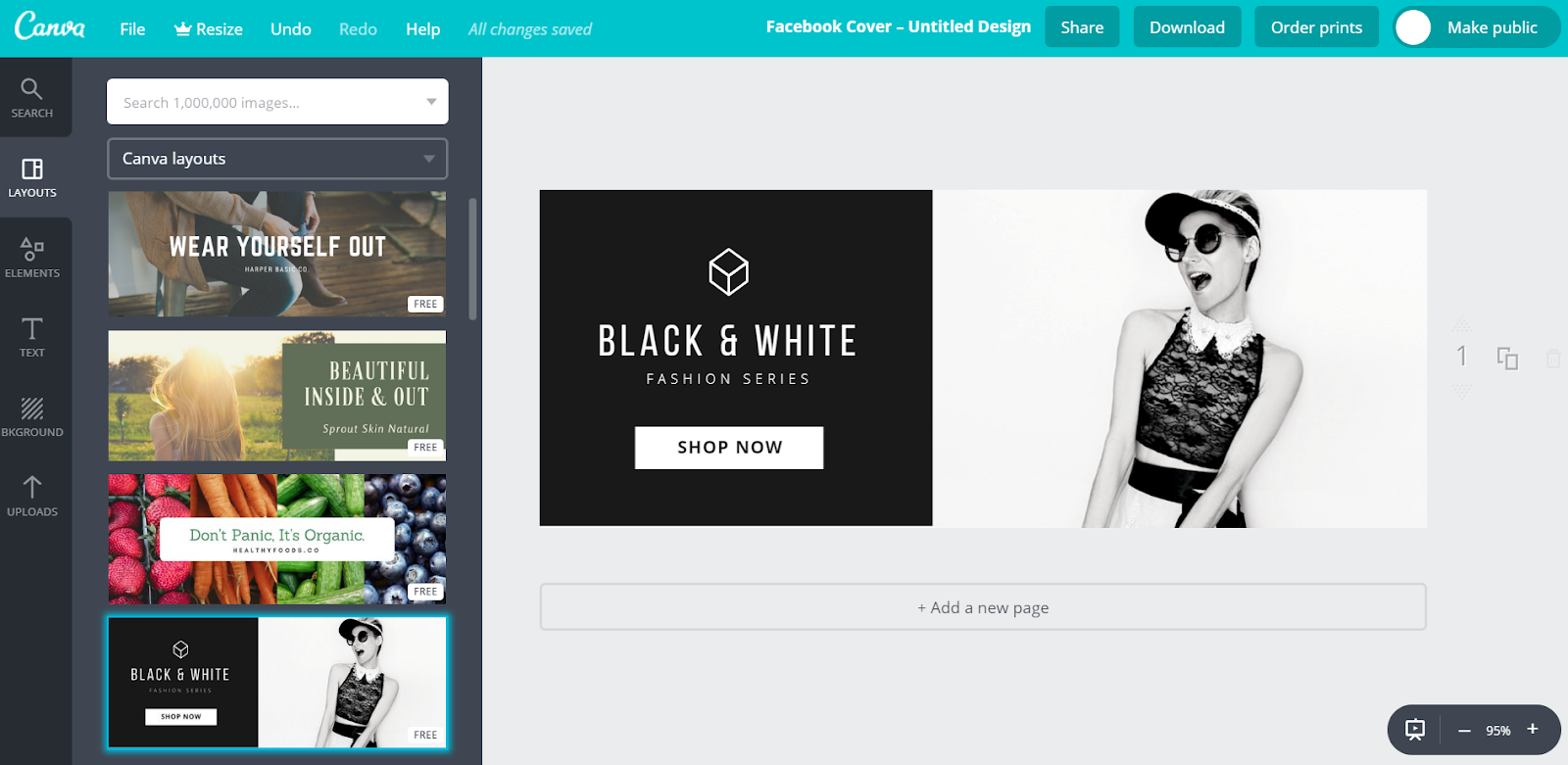
With these details taken care of, your Facebook Group immediately looks more legitimate in the eyes of potential members rather than something thrown together without a second thought.
Provide Some Serious Value
Whether it’s exclusive content or one-on-one interactions, your Facebook Group needs a specific value proposition to encourage meaningful members.
Remember: groups are not just an echo chamber to post about your product or service. People need a more compelling reason to join that “just because” (but more on that later).
Consider that most successful groups are centred around Q&As, feedback threads and debate. These sort of discussions not only encourage activity, but are also exactly what Facebook’s algorithm
But how do you promote these interactions and get more eyes on your Group in the first place?
How to Grow & Engage Your Facebook Group

To guarantee that you get your followers talking, you need to be consistent in terms of your content.
This means showing up day after day with fresh content and discussions for your followers to eat up.
The beauty of Groups is that the responsibility of creating content isn’t solely on your shoulders. For example, threads with daily questions, polls and user-generated content invitations (think: “post where you’re working from today”) are all smart ways of driving meaningful, organic engagement.
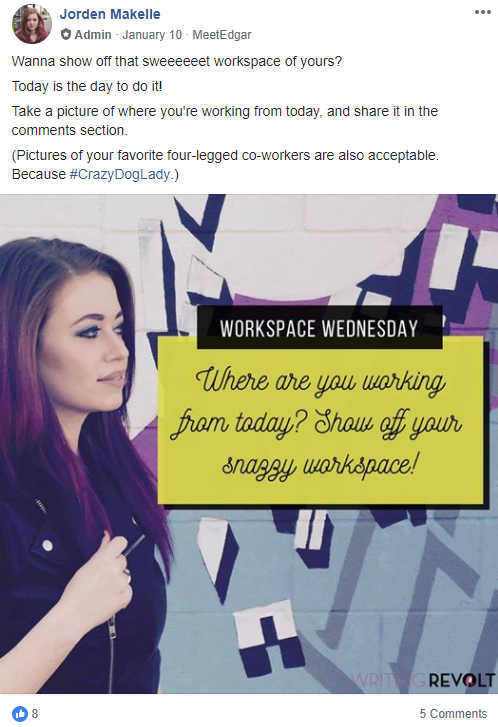
This sort of back-and-forth is what makes any given group so valuable and will ultimately entice either to join up and become part of the conversation.
Combined with entertaining content like memes and Live video, you can keep your Group engaged and come up with a content calendar to keep people on their toes.
As noted earlier, businesses don’t always do the greatest job of putting their Groups front and centre for potential members. Some low-hanging ways to drive more traffic to your Facebook Group include:
- Dropping a link in your brand’s email signature (or promoting your Group in an email blast to your list)
- Mentioning your Group in any sort of post-sales communication (“Thanks for your purchase. By the way, have you seen our Facebook Group where we offer ongoing service and advice for customers?”)
- Promoting your Group in community forms such as Reddit: you can even promote your Group in other Groups if admins are okay with it
- Shouting-out your Group on-site (think: via blog posts or a permalink) and likewise hype it up on your other social channels (who says you can’t promote Facebook on Twitter?)
The Importance of Moderation and Facebook Groups
To wrap things up, let’s quickly discuss why moderation matter so much in Facebook Groups.
You may notice that many Groups are closed or require authentication questions prior to letting members join.
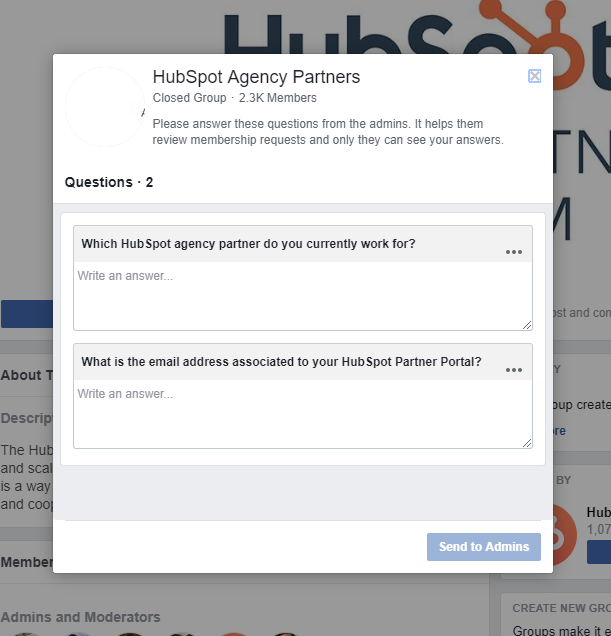
Well, that’s no accident.
Facebook Groups are notorious hotbeds for spam From people dropping random links to competitors trying to spam or steal your members away, there’s a lot that can go wrong if your Group is left unchecked.
That’s why it’s common for Facebook Groups to have multiple moderators in addition to requiring posts to be approved. This won’t stifle the discussion within your Group, granted you’re diligent and keep an eye on your notifications to keep the ball rolling.
This all ties into the idea of consistency, though. Facebook Groups aren’t something that you can put on autopilot: they represent a living, breathing community that deserves your attention.
How Are You Using Facebook Groups for Business?
If you’re stumped on how to handle Facebook in the wake of its most recent algorithm shift, look no further than Groups.
And although there is some legwork involved, the value of having your very own engaged community that you can speak and sell to around the clock is invaluable.







